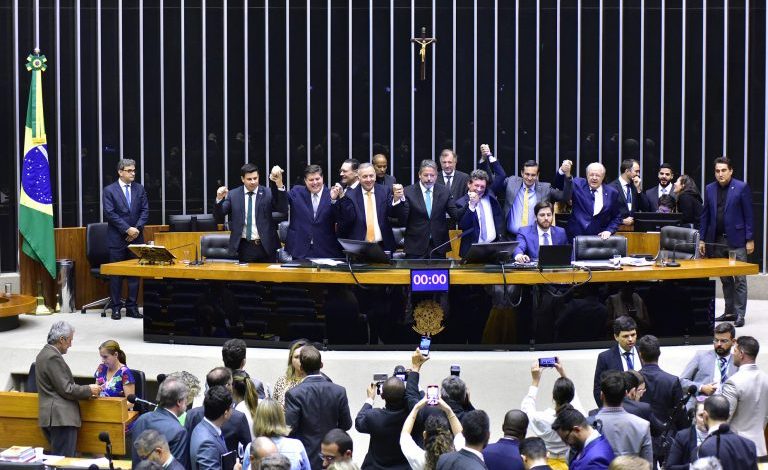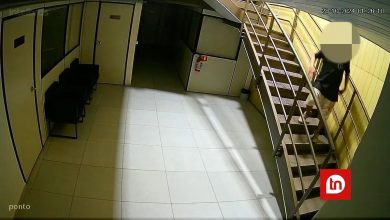Câmara dos Deputados aprova reforma tributária com fundos para desenvolvimento regional e comemoração pela aprovação do texto.

The approved text is a mixture of versions from the Chamber, by the rapporteur Aguinaldo Ribeiro (PP-PB), and the Senate, by Senator Eduardo Braga (MDB-AM). Therefore, it will be possible to promulgate the proposal without another vote. Aguinaldo Ribeiro stated that the Congress did “the impossible” by approving a proposal that has been discussed for many years. “We overcame the impossible, because it was one barrier after another, with those who preached for disbelief; but the courage and determination of many made this moment possible,” Ribeiro said. He declared that the Congress delivers a reform to Brazil that will bring advancements. “Our tax system has been faulty for a long time, the burden is already extremely high. We are reducing the burden because we are going to increase the revenue base and we are going to end the cumulativeness. At this current moment, nobody knows how much tax they are paying,” he added.
According to the proposal, a supplementary law will create the Tax on Goods and Services (IBS) – to encompass the ICMS and the ISS – and the Contribution on Goods and Services (CBS) to replace the PIS, PIS-Importation, Cofins, and Cofins-Importation. With federal resources, to the current values of R$ 730 billion over 14 years and budgeted outside the fiscal limits (Supplementary Law 200/23), the PEC creates two funds: one to pay by 2032 for the tax exemptions of the ICMS granted in the context of the so-called fiscal war between states; and another to reduce regional inequalities.
The text also establishes other ways to compensate for revenue losses during the transition to the new format, one within the IBS revenue collection mechanism and another specifically for the apportionment of the Tax on Industrialized Products (IPI), which will continue to apply only to products outside the Manaus Free Trade Zone (FTZ) and produced within it as well. The aim is to maintain the competitiveness of this special production area.
Since the topic has been addressed over the decades, one of the novelties in relation to all versions already presented is the exemption of the IBS and CBS on products from a nation-wide basic food basket to be defined in a supplementary law. The basket must take into account regional diversity and guarantee healthy and nutritionally adequate food. The text also provides for 100% or 60% exemptions from the rates for certain sectors or types of products, as long as those applied to the others are increased to rebalance the revenue of the federative sphere (federal, state/district, or municipal/district).
Among the sectors benefiting from a 60% reduction in the rate are: education and health services, medicines and medical equipment, collective passenger transportation, agricultural inputs, artistic and cultural productions, and food destined for human consumption. A supplementary law will define which services or goods from these sectors will be eligible. The PEC also refers a supplementary law to define services that may benefit from a 30% reduction in rates when provided by professionals whose work is submitted to a professional board, such as lawyers and doctors.
With the approval of an amendment from the MDB-PSD coalition, the Plenary included in the text a passage from the Senate that the rapporteur proposed to leave out. It consists of eliminating the current sub-ceiling for the salaries of careers in the tax administrations of states, Federal District and municipalities. Instead of the maximum salary following the governor’s or mayor’s subsidy, the federal ceiling will prevail, currently the subsidy of the ministers of the Supreme Federal Court (STF) amounting to R$ 41,650.92. IBS (state and municipal) and CBS (federal) will depend on a supplementary law to be created and their collection will be tested for one year in 2026, when the CBS will be collected with a rate of 0.9% and the IBS of 0.1%. Although the IBS is a state/municipal tax, both it and the CBS may be offset by companies with the amount due for PIS/Cofins or PIS-Importation/Cofins-Importation (in the case of importers). If the taxpayer cannot offset with these taxes, they may do so with others due at the federal level or request reimbursement within 60 days.
The passage of the PEC encountered a great deal of opposition, a great deal of support, and a great deal of controversy. Sas well as a process of continuous negotiation. As with many PECs, it went to a final vote which was approved by a narrow margin. Opening the vote to the public also gives a new perspective. This is followed by a promulgation event which marks the ceasing of an extensive process. This process has been complex, and it has a significant impact both legally and economically. For many, it represents a turning point and a milestone. For instance, for those opposed, it represents a challenge to the status quo. This decision shifts the power dynamic. The chamber of deputies has a chance to prove that they made the right decision by solving multiple problems through one proposal.
This reform has come in a context of political unrest and widespread social anxiety, and in many instances it has been perceived as a light at the end of a long tunnel. It rebalances Brazil’s place in the world. How it will be perceived is still unknown, with experts divided. That being said, it leaves Brazil with a strategic advantage.




